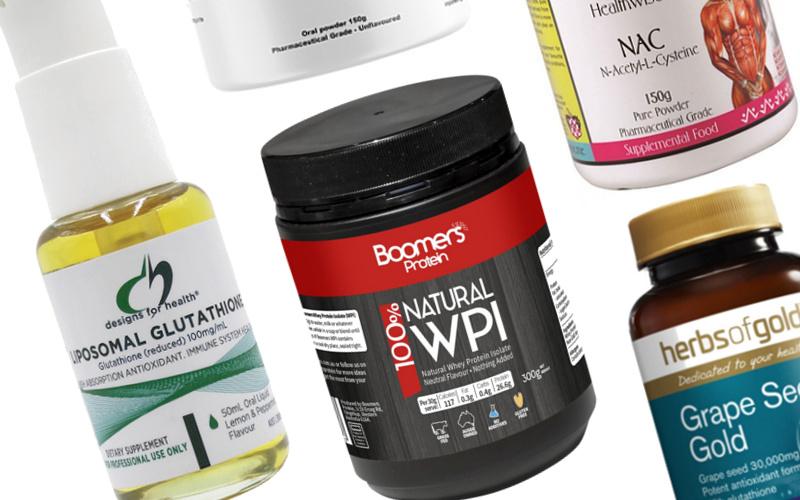What is Glutathione and why is Glutathione important?

Glutathione (GSH) has been deemed the king of antioxidants. Found in almost every single cell of the human body, its healing properties have lent themselves to a plethora of physiological benefits.
Foods which assist the production of Glutathione:
-
High protein meats,
-
Eggs
-
Cruciferous vegetables
-
Pulp in watermelon
Glutathione (GSH) has been deemed the king of antioxidants. Found in almost every single cell of the human body, its healing properties have lent themselves to a plethora of physiological benefits. Protecting against oxidation stress, neutralizing pathogens[1] and contributing to liver detoxification, Glutathione (GSH) possesses obvious benefits for human development.
What is Glutathione made from?
Let’s talk a little bit about glutathione’s structure so we can understand more about how it works and where it can be found. Glutathione is a sulfur-rich tripeptide, meaning it is comprised of three amino acids – glycine, cysteine and glutamic acid. Manufactured in the liver, this major biomolecule is created post consumption of sulfur-based foods and certain amino acids such as cysteine (a precursor for glutathione production, which can be found in the supplemental form of NAC).
These foods consist of high protein meats, eggs, cruciferous vegetables and peculiarly, the delicious pulp in watermelon. However, it is important to note that dietary glutathione is non-essential and therefore not entirely absorbed by the body. This also means, that as we age, glutathione levels naturally decrease. This is where oral forms of supplementation may work in one’s favour.
Why is Glutathione important?
Poor health can be caused by free radical damage, lending to pathogenic development and early onset ageing. Free radical damage is generally caused by the environments in which we live such as exposure to high UV rays and consumption and inhalation of xenobiotic compounds such as heavy metals, pesticides and industrial chemicals. In order to halt these compounds in their track, glutathione binds to them, helping to safely excrete them from the body.
Glutathione aims to prevent cellular harm induced by these foreign invaders, whilst protecting hepatic[2] and renal integrity[3]. Indeed, research over the years has even shown that glutathione can help to prevent against neurodegeneration[4], improve cardiovascular health[5], pulmonary health and even assist with infertility in both men and women[6].
Experts suggest that one can take up to 500 to 1,500mg of glutathione a day. In fact, to ensure you are getting the most bioavailable benefits from glutathione, liposomal forms are of great advantage as they tend to have greater rates of absorption. Other suggestions include taking glutathione in conjunction with supplemental NAC and Vitamin C. These are two molecules which also retain strong antioxidant properties.
Which vitamins assist the production of glutathione levels?
Ensure your diet is high in other natural antioxidants and vitamins such as B6, B12, B9 and selenium as they also assist in natural glutathione production and decrease chances of deficiency.
And finally, always consult your health care practitioner before introducing supplemental glutathione into your daily regime.
Cautions
The information presented in this article is intended to be general in nature. Always seek medical advice from your qualified practitioner before using any supplements or following any information presented on this website.
Taking supplemental Glutathione may not be for everyone. Talk to your qualified practitioner to determine if it’s right for you. Possible side effects may include:
- Bloating
- Breathing difficulty
- Abdominal cramps
- Allergic reactions
Supplements you may like to view -
- Clinical Extracts NAC Powder | N-Acetyl-Cysteine - Click Here
- Designs For Health Liposomal Glutathione 50ml - Click Here
- Herbs of Gold Grape Seed Gold - Click Here
- Boomers 100% Whey Protein Isolate - Click Here
- BioCeuticals Glutathione Capsules - Click Here
- BioCeuticals Liposomal Glutathione - Click Here
[1] Weschawalit, S., Thongthip, S., Phutrakool, P., & Asawanonda, P. (2017). Glutathione and its antiaging and antimelanogenic effects. Clinical, cosmetic and investigational dermatology, 10, 147–153. https://doi.org/10.2147/CCID.S128339
[2] Pizzorno J. (2014). Glutathione! Integrative medicine (Encinitas, Calif.), 13(1), 8–12.
[3] Lash, LH. (2005). Role of glutathione transport processes in kidney function. Toxicology and Applied Pharmacology, 204(3), 329-342. http://doi.org/10.1016/j.taap.2004.10.004
[4] Minich, D. M., & Brown, B. I. (2019). A Review of Dietary (Phyto)Nutrients for Glutathione Support. Nutrients, 11(9), 2073. https://doi.org/10.3390/nu11092073
[5] Adeoye, O., Olawumi, J., Opeyemi, A., & Christiania, O. (2018). Review on the role of glutathione on oxidative stress and infertility. JBRA assisted reproduction, 22(1), 61–66. https://doi.org/10.5935/1518-0557.20180003
[6] Adeoye, O., Olawumi, J., Opeyemi, A., & Christiania, O. (2018). Review on the role of glutathione on oxidative stress and infertility. JBRA assisted reproduction, 22(1), 61–66. https://doi.org/10.5935/1518-0557.20180003







